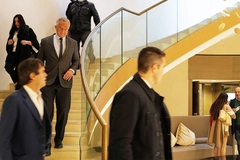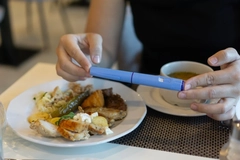
- Industry news
Industry news
- Category news
Category news
- Reports
- Key trends
- Multimedia
- Journal
- Events
- Suppliers
- Home
- Industry news
Industry news
- Category news
Category news
- Reports
- Key trends
- Multimedia
- Events
- Suppliers
Dutch Dairy Sector Wants to Be Energy Neutral in 2020

To be energy-neutral, businesses must generate all the energy they require. To achieve this, the new concept is being trialled at a number of businesses, after which the barn will be developed further for wider application.

2/3/2011 --- The Dutch dairy sector has developed the concept of a climate-neutral barn, which was presented at the Grüne Woche in Berlin. The climate-neutral barn is fitted with solar panels and biodigesters, so that dairy farmers can supply energy to dairy factories or residential areas. The natural requirements of the cow are paramount, so that the cows can spend as much time as possible outdoors.
“The climate-neutral barn heralds a new step in the sustainability of our sector”, says Tjeerd de Groot, director of the Dutch Dairy Organisation (Nederlandse Zuivel Organisatie). This organisation, along with the Dutch Federation of Agriculture and Horticulture (LTO Nederland), forms the Sustainable Dairy Chain. The objective is for dairy farms and dairy businesses to be energy-neutral in 2020.
To be energy-neutral, businesses must generate all the energy they require. To achieve this, the new concept is being trialled at a number of businesses, after which the barn will be developed further for wider application. “The idea is that we acquire the know-how and experience with this innovation, so that we can roll it out to all dairy farms in due course. Milk is the green engine. As a sector, we are very happy to invest in it: we hope that the government will also make a contribution”, says Siem Jan Schenk, chairman of the Dairy Farming specialist group of the Dutch Federation of Agriculture and Horticulture.
The Sustainable Dairy Chain is asking the government to make a contribution via the new Sustainable Energy Subsidy Scheme. The Dutch dairy sector is investing EUR 250 million annually in sustainability.
The Sustainable Dairy Chain is an initiative of the Dutch Dairy Organisation and the Dutch Federation of Agriculture and Horticulture. They want to be energy-neutral in 2020. Other objectives include a 30% energy saving and a 30% reduction in greenhouse gas emissions compared with 1990. The dairy sector has huge economic significance: the Dutch dairy sector contributes 6% to the Dutch trade surplus.
Many FrieslandCampina member dairy farmers are already actively involved in sustainability. The Executive Board of FrieslandCampina wants all member dairy farmers to tackle sustainability in a targeted way and for the performance of all members to be transparent. How members put sustainability into practice in their own business is still to be decided. A series of discussions with member dairy farmers on this subject started on Monday, 17 January 2011.










